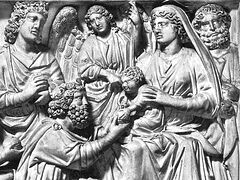Suppose that you could earn points for behaving morally. For simplicity’s sake, let us limit the number of areas on which one’s moral conduct can be assessed to just the following four:
· Being truthful
· Respecting women
· Avoiding aggression
· Avoiding drugs
If two points were awarded for perfectly fulfilling each of the moral requirements above, then one who manages to be honest, treat women well, avoid aggression, and abstain from drug use could earn up to eight points.
Now ponder the following scenario. Hank was born and raised in a culture where the moral rules listed above are completely absent. As a consequence, he has developed into a man who regularly lies, beats his wife with a stick, picks fights with random people, and smokes pot every night. In short, he has a moral score of zero. However, he is open to changing for the better, and you, a moral teacher, have taken it upon yourself to help. How, exactly, would you begin this redemptive task? If, in addition to admonishing him to always be truthful, you prescribe that he never again hit his wife, engage in unprovoked violence, or get high, how would he respond? Would it surprise you if he rejected your rules outright, laughing in your face, or—if he was more humble - confessing that he simply does not have the strength to attain to such high moral standards?
What if, instead, you temporarily settled for a partial fulfillment of these moral requirements, in which case Hank would receive half credit for meeting each? That is, what if you prescribed that he abstain from lying, at least in cases where it would directly affect another; beat his wife only in limited circumstances, and only with his hand; pick fights only with those who have wronged others; and finally, smoke pot only three days a week, rather than all seven? Would Hank not be far more likely to agree to this particular and less burdensome set of commandments? True, meeting these lower standards would yield a moral score no higher than four. But that is still four points higher than his current score.
Imagine how ignorant of Hank’s context one would have to be if he were to judge him, and your rules, by the moral standards of a different culture that expects its members to earn nothing less than a moral score of eight. This is similar to how many atheists view the people and teachings of the Old Testament. Aside from the irony of their real or affected moral outrage,1 such reactions betray an apparent ignorance of cultural anthropology, from which arises the assumption that one could attain to a higher moral standard than the depraved “other” if he was born and raised in the same cultural context.
Of course, as Hank’s teacher, you should not remain content with a moral score of four. Your eventual goal should be to prepare him, one step at a time, for a more elevated moral philosophy. There should come a time, once his heart has been softened through continuous practice, when you will teach him to hold his wife, not hit her; resolve his conflicts through dialogue, not violence; and so on.
Christian revelation proceeded in similar steps. As Russian theologian Alexei Osipov notes,
“The first step, Old Testament Revelation, was ethnically limited. It was given in language and forms corresponding psychologically to the Jewish people and their spiritual, moral, intellectual, and esthetical capabilities. Because of this, it was naturally imperfect in many ways” (The Search for Truth on the Path of Reason, p. 60) [emphasis added].
He further points out that “the nature of Old Testament religion noticeably changes in the Psalter and the prophets,” where one finds more emphasis on purity of heart (e.g., Psalm 50) and humility (e.g., Isaiah 57:15) (p. 231). What Osipov speaks to is a historical process of moral development, of which the people of the Old Testament should never be studied in isolation. It is a process that continued with the coming of Christ, through whom the Old Testament is viewed anew; who taught us that all of its rules hang on the commandments to love God and one’s neighbor (Matt: 22:40).
Recognizing, therefore, the moral substance of these rules, we discover that, contrary to what many atheists allege, there is no fundamental contradiction between the teachings of the Old Testament and those of the New. What we find, rather, are differences in the practical applications of what, ultimately, is the unchanging commandment to love.2 Consider the Bible’s teaching on marriage. Whereas Jesus forbade divorce, except in cases of adultery, Moses permitted it. The latter did so, however, not because he held a different moral view on divorce, but because of the difficulty of abiding by it, owing to the ancient Jews’ hardened hearts (Matt. 19:8). In other words, Moses wisely practiced oikonomia, realizing that if rules are not properly calibrated to people’s actual condition—if the rules are so difficult to adhere to that people despair of their ability to do so—then their moral state may never improve, and may deteriorate even further, as they expend no effort towards making even the smallest progress in abiding by the moral principles of which these rules are but applications. Likewise, allowing Hank to pick fights in certain cases does not imply a rejection of the moral principle that aggression is wrong. Rather, it is an application of this principle that is particularly suited to Hank’s present state.
Some critics may allege that Christians have fallen back on this appeal to moral evolution3 as a desperate attempt to salvage their faith after supposedly more enlightened modern readers “discovered” the Old Testament’s “morally problematic” passages. Well before the modern age, however, one of Christianity’s earliest heretics, Marcion of Sinope (85–160), levelled the same charge against the Old Testament. Like many atheists today, he portrayed the God of the Hebrew Scriptures as cruel and vindictive. Of particular significance is the fact that the Church did not excommunicate him while nonetheless affirming his depiction of the Old Testament God. (In other words, they didn’t effectively say, “So what if the Old Testament God is cruel and vindictive? We like him that way!”) No, he was anathematized on account of his blasphemous caricature of the God of love, which was shaped by an unduly literal and decontextualized reading of the Scriptures. Thus, nearly two millennia before the advent of the modern atheist movement, the Church openly denounced this manner of interpretation.
Sadly, this hermeneutic has been revived in recent years, not least because many in the West build their understanding of the Scriptures not on the pillar and foundation of the truth, but rather on the sand of their own fallible minds. May we all return to this foundation and answer our atheist challengers with one resounding voice.





